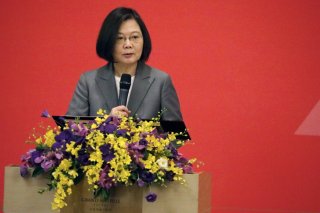The Tokyo-Taipei Calculus: Will Taiwan Soon Join the CPTPP?
Taiwanese accession to the CPTPP would mark a massive strategic win for Taiwan, for the democratic CPTPP member states, and of course, for Tokyo’s international stature as a multilateral leader.
Taiwan’s CPTPP entry would not be a minor development that Tokyo can skate past China. Beijing has actively worked to ensure that Taiwan remains outside regional and global multilateral setups and agreements. By applying political and economic pressure, China has reduced the number of states that recognize Taipei from twenty-two to fifteen since 2016 while Chinese President Xi Jinping has warned Taiwan that its “unification” with the Chinese mainland is a foregone conclusion—and that usage of “force” to achieve this objective is very much a possibility. Taiwan’s wish to join the RCEP was quickly vetoed by China, leaving CPTPP as Taipei’s only remaining viable option to consolidate its economic benefits.
China’s absence from the CPTPP bloc, and its deteriorating ties with several members (especially Japan, Australia, Canada, Vietnam—and the United States, should it rejoin), vastly expand Taipei’s chances of admission. Moreover, with China itself considering the CPTPP (though Japan would sternly oppose Beijing’s inclusion), the timeframe for Taipei to consolidate itself in the agreement draws close. Taipei must convince CPTPP members to pick Taiwan over China—a difficult and idealist feat that, if successful, could for once allow Taiwan the chance to “veto” China’s proposed accession to the free trade agreement should it join first. This is clearly a testing time for Taipei’s diplomacy.
At the same time, Japan is blatantly aware that deeper integration with Taiwan—not only through the CPTPP but also through other key multi- and mini-lateral projects in the Indo-Pacific like the Supply Chain Resilience Initiative (SCRI)—is critical to make a political statement vis-à-vis China. Collaboration between Taiwan and the fifteen countries that recognize its sovereignty can, therefore, act as a counterweight to China’s growing clout, no matter how small these fifteen countries are. Considering the post-pandemic focus on supply chain resiliency, this can be a crucial area where a political or strategic pact with Taiwan is significantly advantageous.
As like-minded states seek to stabilize the region by balancing China’s growing power or influence, outreach to Taiwan is an absolute necessity. The first step for such outreach must stem from economic ties and Taipei’s inclusion in the CPTPP—particularly considering its exclusion from the RCEP. Taiwan first expressed its wish to join the trans-Pacific pact in 2011 under President Ma Ying-jeou’s “golden decade plan”; like with APEC, the present external geopolitical environment (with China’s ties with democratic powers eroding) can feasibly facilitate its membership to this multilateral economic framework. The present surge in synergy between Taipei and countries such as Japan and Canada could make Taiwanese membership probable despite China’s opposition. If Taiwan accedes to the CPTPP, that would certainly mark a massive strategic win for Taiwan, for the democratic CPTPP member states, and of course, for Tokyo’s international stature as a multilateral leader.
Dr. Jagannath Panda is a Research Fellow and Centre Coordinator for East Asia at the Manohar Parrikar Institute for Defence Studies and Analyses, New Delhi. Dr. Panda is the Series Editor for “Routledge Studies on Think Asia.”
Image: Reuters.

